“Do I have to undertake Thai military service?” is one of the most common questions that arises for male Thai citizens born and living overseas, as well as dual citizens born in Thailand.
As a basic rule, all healthy males with Thai citizenship who are resident in Thailand are required to report to a conscription officer at age 20. The only men who don’t have to go through the conscription process are naturalised Thai males or those who have completed the territorial defense program while at school.
Undertaking conscription is still a major rite of passage for most young Thai men. Having fulfilled your obligation is important from a general legal perspective, but also important given some employers – particularly in the public sector – still require evidence of completing your obligation.
Conscription
Thai males who are registered in Thailand on the tabieen baan (house register) are normally sent initial administrative papers about their obligation at age 17. They are expected to respond to this letter in anticipation for being sent instructions for presenting themselves for the conscription lottery at 20.
The basic health requirements are as follows:
- Be free from diseases and disabilities that can interfere with military service; and
- Height at least 160 cm or more and a chest circumference of 76cm measured when exhaling.
Those with a suspected disease or disability contrary to military service are required to be examined at one of the 20 Army hospitals in the country between October and February in the year of being eligible for conscription.
On conscription day, eligible recruits will take part in a lottery, picking coloured ball out of a barrel. Those who choose a red ball will be drafted for 2 years. Choose a black one, and you are home free.
Registration is handled by the local recruitment officer – the Sasadee (สัสดี) located the local district office (สำนักงานเขต) where your father or mother are registered on the house book/tabieen baan (ทะเบียนบ้าน).
In 2017, a little over 100,000 twenty year-olds, joined the armed forces. Most (78%) went into the army, 14% into the Navy and 8% into the air force. Of these, 49% volunteered for Thai military service and the remainder were conscripted.
The local office will usually provide statistics on how many in that district need to be conscripted to meet the local quota. In some areas, the ranks are mainly filled with volunteers who see the military as a good employment option. As such, the actual number (and the chance of) needing to be conscripted may be low, depending on the district.
Some basic misconceptions and myths:
Before we examine the legitimate ways of de-risking your chances of being conscripted, let’s look at some misconceptions about what gets you exempted.
- Myth 1: Dual citizen children are not eligible for conscription;
- Myth 2: Not speaking Thai exempts you from selection;
- Myth 3: Children who aren’t ethnically Thai aren’t eligible to be conscripted; and
- Myth 4: Becoming a monk automatically exempts you.
Having read the rules from start to finish, there is nothing in the regulations that refer to these factors as exemptions. Don’t be caught out by rumours to the contrary!
The (lack of) Thai language one is often cited to me, however the fact is there are loads of kids from Khmer, Malay or Lao speaking regions of Thailand whose central Thai may not be terribly strong – let alone literate – but they are as eligible as a Thai male who only fluent in a European language.
Indeed, English language skills are useful to the military, particularly for intelligence related roles. Though it isn’t unknown to find those who have been exempted because of their lack of Thai speaking skills – do not rely on this as a general rule!
The ONLY impediment for Thai males with a foreign parent is that they are ineligible to become an officer in the Thai armed forces. While other areas of Thai law have mainly removed discrimination based on parent’s nationality (e.g. eligibility for being an MP), this rule remains firmly on the books of the Thai military for the time being.
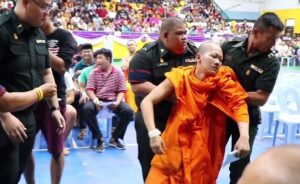
Its also worth noting that becoming a monk doesn’t automatically exempt you. Only monks who have undertaken higher (divinity) level Buddhist education within the Mahajana sect (พระภิกษุที่มีสมณศักดิ์ชั้นเปรียญ นักบวชนิกายมหายาน) and monks and novices who have been certified by the Ministry of Education (สามเณร ภิกษุ นักบวชพุทธศาสนานิกายมหายาน ที่ได้รับการรับรองจากกระทรวงศึกษาธิการ) are automatically exempted.
As such, those serving as monks, who fall outside these categories will need to report for military conscription, and it isn’t an uncommon sight to see ordained men lining up on conscription day to see if they are chosen for Thai military service.
Legitimate exemptions from the military draft
While a good proportion of applicants see military service as a way out of poverty, or as a way to serve their nation, others have personal reasons for avoiding being conscripted for two full years right at the start of their 20’s.
Regulations thus contain some thoroughly above-board ways to avoid having to be conscripted, or at the very least, delay it. These include the following:
1) Territorial defense program
This program, known colloquially in Thai as Ror Dor (รด) is the equivalent of army ‘cadets’ in places like the UK or Australia, or the ‘ROTC’ in the US.
This is one of the main methods Thai kids use to avoid the lottery. If you are parents of young children, then selecting a high school with a ‘Ror Dor’ program might be something worth thinking about. International schools generally also offer ‘Ror Dor’ as well.
The concept is very simple. In the senior years of high school (and in some cases university), a child can sign up and participate in training during school hours a few days per month for three years. This provides an alternative form of basic training which culminates in a multi-day camp at the end of the program. After the full three-year course is completed, the students receive exemption papers for the draft at age 20.
For partial completion of Ror Dor, credit will also be given. Completing one year of Ror Dor means only having to serve full-time for one year if conscripted. Similarly, completing two years of reserve training means only doing six months of full-time training if conscripted.
For those who start, but don’t complete the Ror Dor course at high school, they are permitted to carry on with the course for 2 more years at university.
2) University/Post graduate studies
Whether in Thailand or overseas, further studies are an acceptable method of deferring your obligations to attend the lottery.
Thai embassies overseas will have Military Deferment Forms (แบบฟอร์มขอหนังสือรับรองการผ่อนผันการเกณฑ์ทหาร).
3) Volunteering after graduating from university
Following graduation, a university graduate is allowed to volunteer to join the armed forces prior to or on conscription day, and as a result only serve 6 months. This is common for many Thai families who do see some merit in undertaking a short stint of Thai military service.
What commonly happens is a university educated volunteer will do the required 10 weeks of basic training, with the remainder of their service being in office based administrative jobs.
A word of warning though, if you decide to try your luck with the lottery, and pick the red ball, do note that you’ll have to serve to full conscription period, university degree or not.
4) Overseas military service
The conscription rules do state that comparable foreign military service does count towards reducing military obligations in Thailand. How this is administered is unclear, and probably comes down to being assessed a case by case basis.
5) Not moving back to Thailand until you are 30 years of age
All Thai males who report for conscription at after age 30 are automatically released from duty. At this point, according to section 39 of the Military Service Act (see here) once you register for military duty you will be put into the second division of the army reserves, which is an inactive register (ทหารกองหนุนชั้นที่ ๒).
As such, particularly if you are an overseas born Thai, it may be worthwhile staying unregistered in Thailand – no ID card and staying off the house book or tabien baan (ทะเบียนบ้าน) – and only formally registering yourself for Thai military service with the district office when you are past thirty years of age.
After age thirty, so long as you voluntarily report, you will be released from your obligation with a small payment of a fine at the police station. The fine for reporting late ranges between 100 and 300 baht – and a fine at the lower end of that range is usually granted for voluntary reporting.
Strictly speaking, the above process (though undertaken by many) leaves you still open to be considered an absconder in the event of being caught before you voluntarily report. For overseas based Thai dual citizens who want to avoid this small risk (anecdotally, we’ve never heard of any dual citizens being arrested), there is a ‘belt and braces’ approach to stay totally on the right side of the law.
For those who are born overseas, and who have never been registered on a house register or have gotten an ID card by the age of 17, you are able to send someone on your behalf to report. The rules allow for an adult representative to bring your Thai embassy issued birth certificate to the recruitment office. According to the rules, this must be done in the district office where your Thai mother is registered, but if your mother is not a Thai citizen, then you can do so in your fathers registered district.
By way of process, the Sasadee office will begin the process register the enlistee via the Sor.Dor 44 form. Given the lack of house registration and ID card (which are on the list of required documents for conscription), the Sasadee will send your file to the district office head, who is empowered to delay the processing of the registration till such time as these documents are produced. Nevertheless a record will be kept of the attempted registration and a copy shall be given to the representative who reported on your behalf. Importantly, this record will be proof that an attempt to register has been made, and this is sufficient proof under law to prove that the enlistee did not attempt to abscond.
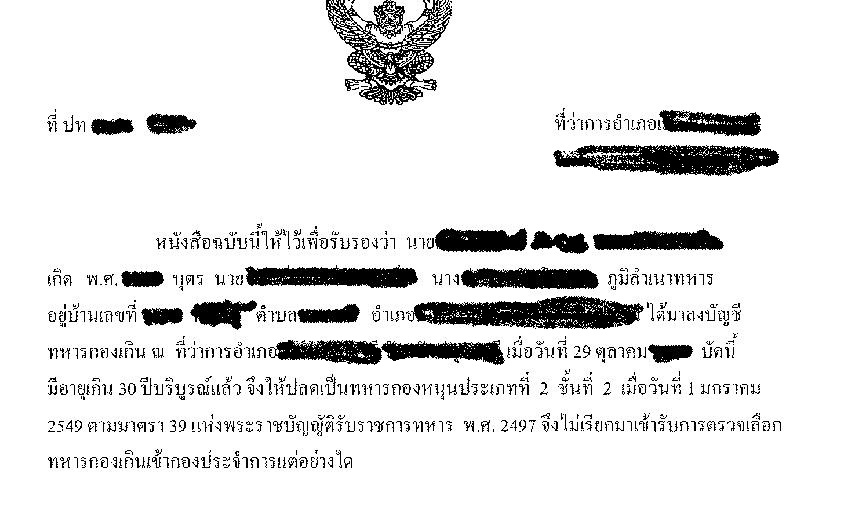
- Thai military exemption letter for those who are aged over 30.
If I live overseas, can I travel back Thailand on a Thai passport if I haven’t reported?
Up until the late 1990’s, for those over the age of majority, having your military release papers was a requirement for being issued a Thai passport. Now, Thai passports are generally issued to anyone, except to those who have been charged by a court of absconding.
The real issue is whether you are normally resident in Thailand and thus, liable to report for conscription. This is a very grey area, but short trips are normally fine and many dual citizens travel to and from Thailand regularly. But if you intend to visit for longer periods then the risk increases that you will be considered liable for duty so you should be aware of your responsibilities on this front if you move back to Thailand before age 30 for an extended period of time.

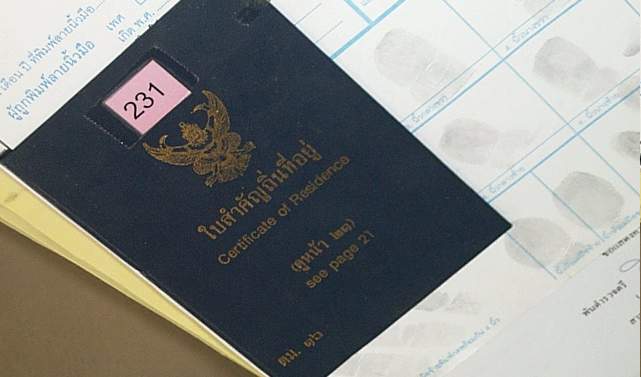
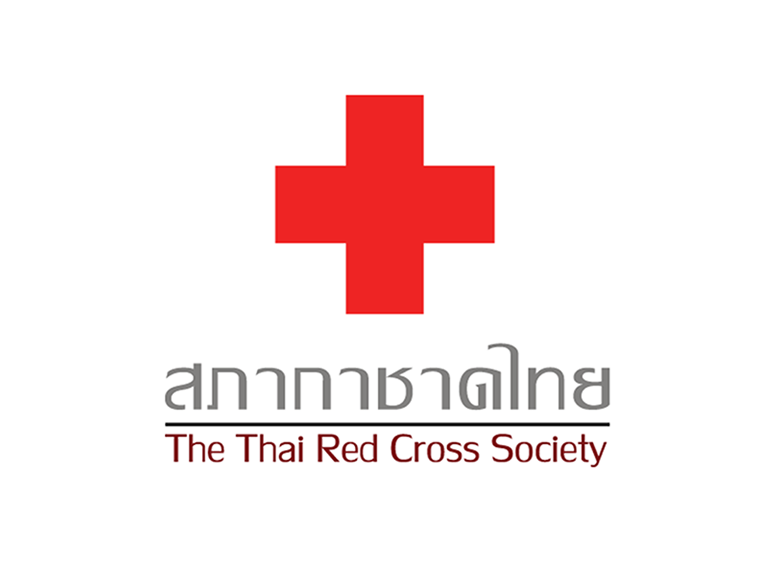

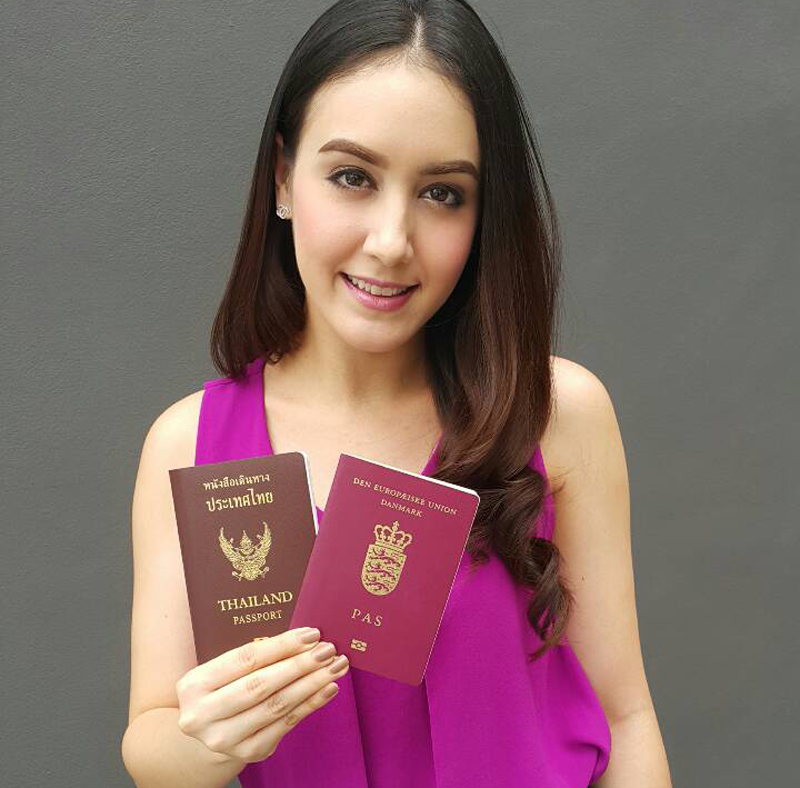



My American wife recently received Thai citizenship, and my American son (14) received Thai citizenship shortly after due to his mother now being Thai.
So he has zero Thai blood and is fully a Thai citizen now (naturalized is the word?)
He has Thai ID card, lives in Thailand and is on the house blue book.
Since he was not born Thai, will the conscription rules apply? I read somewhere else that naturalized citizens aren’t eligible for conscription, but don’t have it on good authority.
The article briefly mentions continuing education as a way to defer. If my son is enrolled in university in Thailand, does that defer him, and is there a defined process for that? I assume local universities could advise
Thank you for the very informative article ☺️
Hi Jake,
Article 14 Section 8 of the military conscription legislation states it clearly: http://report.dopa.go.th/laws/document/2/238.pdf
There is a big ‘but’. So I was fascinated with your background (Thai’s with no Thai blood are rare, but are around and I’m friends with a few of them) so I did a bit of digging and saw a video of you saying wife was born here? I’m guessing, but she received the Thai citizenship due to being born here to two foreign parents who both had permanent residency. (And when I say that, she didn’t have to go through a multi-year naturalization process involving the Minister and the King signing off on her and your son’s citizenship application).
If the latter is the case, then your son is technically a natural born Thai (as is your wife). So they were not naturalised in the strictest sense of the meaning. They are just regular plain ole Thai citizens.
So the thing is you are just going to have to wait. If your son is on the radar he’ll start receiving information about preparing for the call up around 16. I’ve got no way in telling what will happen but if your son is at school you might want to enroll him in Ror Dor to fulfil his obligation. University will only defer it and reduce the obligation if he then decides to volunteer.
Cheers
TC
Thanks for the quick reply! Yes, you found the right video 😉 Your description of how the scenario in which my wife got Thai citizenship is correct. Quite a rarity for sure!
Ror Dor it is! 😉 Several schools offer it in our area so we’ll be pursuing that track.
Excellent. Fingers crossed they know what to do with him! Several of the international schools offer it too and they sort of help make the process a bit more fun and less a chore if that makes sense.
How long do you have to wait till u find out if theirs is a warrant out u for failing to report for the military draft? I want to go on holiday to Thailand this summer with my friends but not sure how long I have to wait for the warrant letter to get posted
I don’t know the answer to that question – you really need to get a relative to go speak to the conscription office where you are registered to find out what proceedings they have out against you. Have you let them know you are no longer in Thailand?
Yes I told them last year that I was doing my final year of university and that have move to the uk since I was 7-8
And what did they say to you after that?
Hi, I was born here in the UK. I’ve lived here till the age of 11 years old and I have lived in Thailand for 10 years with my British dad who moved to Thailand. I am now 24 years old. I was aware of the army conscription when I turned 20. Because I have a few health issues my Thai mum has reported this to the Army offices so I had official documents to say I wasn’t fit to go. But the thing I was worried about I have a Thai ID card a passport and my name is also on my mum’s land papers. Because of the stress of it all I left Thailand back to the UK after living in Thailand for 10 years. Luckily my mum was still in Thailand at the time to report to the Army office that I had left the country due to mental health. My mum asked the officials what could be the consequences, they said I am on a 10 year curfew and that I could be fined if I entered the country on a Thai ID card or passport. And that once I turned 30 years old I could be given the all clear. But in the mean while if I wanted to go back to Thailand on holiday or live there could they flag up my no attendance of reporting of conscription back in lockdown when this was occurring? And if so should I only enter and exit the country with my British passport? And make use of the automatic 30 day stay holiday visa? And if I wanted to stay longer is it possible to extend the visa and live there on that visa? My dad has always kept a visa in my British passport so I could exit the country with no issues in case of emergencies and in this case it was an urgent exit. Should I keep doing this to avoid any issues? And if so how many times in a year can I visit Thailand on my British passport too? Thank you.
I don’t think what passport you enter on is the issue.
Though the conscription office told your mum about the penalty, you need to check if there is an actual warrant out for you as that’s likely to be served on you regardless of the passport you enter on. So best get that checked out first.
Thanks for the reply, I’m guessing if I use my British passport it would give me better security right?
To be honest I’m not sure given how biometrics can work. Best to get an opinion from the horses mouth at the conscription office to see what they’ve done with your paperwork. IF there isn’t any action against you then entering on either passport would be fine.
Hello, I was born in Thailand and I moved to the United States when I was 5 years old. I’ve recently been told by my mom that the house I was registered in Thailand has been getting mails sent about the conscription. I’ve heard that I might need to attend the lottery soon, but I’m currently in the States. I’m not sure I’ll be able to attend the lottery in time, and I’m unsure if I can even go back to Thailand anytime soon. Is there anything I should worry about? Will I be forced to fly back?
Hi there,
Do you have a Thai ID card?
You have a couple of potential options which you need to research. If you don’t have an ID card, have your relatives go chat to the recruitment office (sasadee) to see what happens if you don’t have an ID card (see the ‘belt and braces’ approach in the article above). See if that process plays out for you, and remain without an ID card until you are 30.
The other option may simply be to take your name off the tabieen baan and move it to the central tabieen baan. This is an option for people who move overseas permanently. Note however, that you won’t be able to have a Thai ID or passport issued until you have your name moved back onto a regular Tabieen Baan.
I do not have a Thai ID card, but my name is on the tabieen baan.
Hi there – my advice hasn’t changed. Get the relatives to go to the conscription office and get them to say that you can’t attend given you moved away from Thailand when you were five, don’t have an ID card etc etc. If they don’t take you off the roll, or at least defer you till you moved back to Thailand, I’d consider taking your name off the house registration.
Hi there,
I was born overseas to a Thai mother and an European father and I am currently living in Europe. I have turned 30 this year and as far as I know, there has never been an ID card issuance or a registration in the house register in Thailand. I would like to apply for a Thai Passwort. I only have a birth certificate from the country I was born, no Thai certificate.
Is it correct, that I would need to report to the local authorities regarding my military services and should not have any trouble getting drafted? There is a lot of confusion about this topic.
Thanks in advance!
So given you are now 30 years of age there is no obligation to report. The only reason you need to report is if you require the exemption certificate which is something you only need if you want to apply for government jobs, apply for thai citizenship for your wife, or run for parliament. If you aren’t intending to do any of these then it’s not needed.
The process to sort your thai citizenship papers should be fairly straight forward. Have a look at this link which will take you through the steps
https://www.thaicitizenship.com/thai-citizenship-when-born-overseas/
This was quick, many thanks to answering my question!